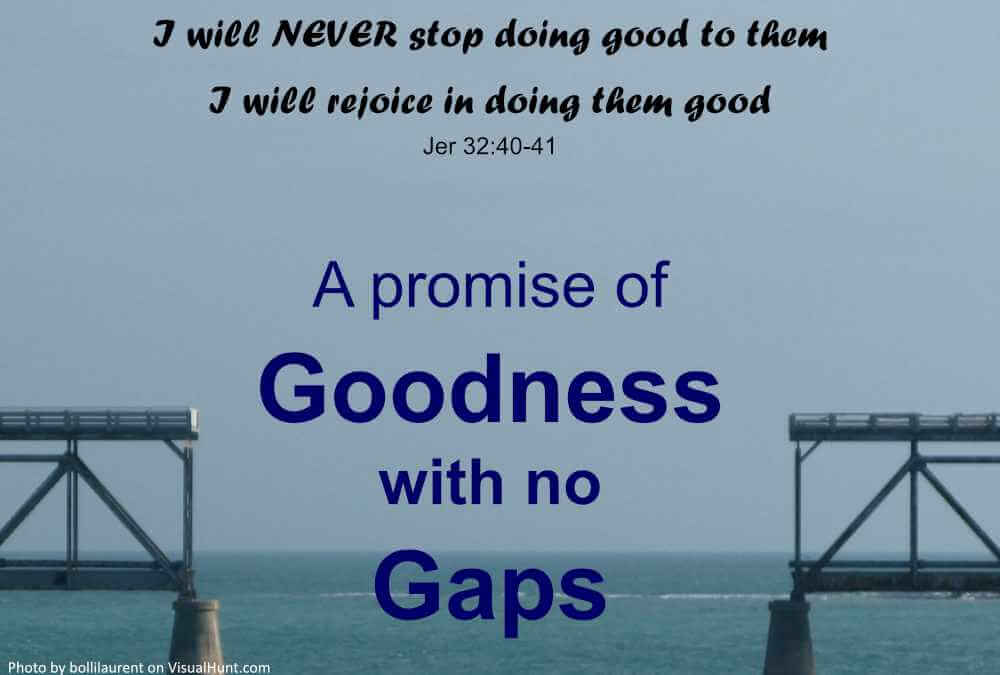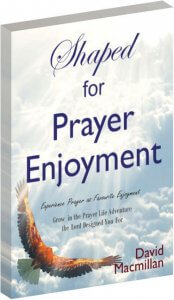The Scene
The scene in Jeremiah 32 is of people facing imminent invasion and the destruction of their city. They are about to be wrenched from all that they love and driven into a pagan land as spoils of war. Thoughts of the future are frozen in fear and hopelessness. In that setting, God gives his amazing promise of goodness with no gaps.
Judah’s long-term sinfulness was reaping a harvest of judgment. Yet the Lord announces an everlasting covenant of goodness. He wants them to know that his promise of goodness with no gaps isn’t a reward for good behaviour. It’s for the undeserving who choose to turn back to him.
Covenant of Goodness
Through Christ, that covenant is for everyone who turns to him. His promise of goodness doesn’t diminish sin’s seriousness, but draws hearts away from it. It reinforces the rescued heart’s awe of him and the desire to never turn from One who loves us so generously.
I will make an everlasting covenant with them: I will never stop doing good to them, and I will inspire them to fear me, so that they will never turn away from me. (Jer 32:40)
The covenant framework is for our benefit. God doesn’t need it to keep himself true to his promise. He will never stop doing good to us because he enjoys blessing those he loves.
I will rejoice in doing them good and will assuredly plant them in this land with all my heart and soul. (verse 41) [MSG version: Oh how I’ll rejoice in them! Oh how I’ll delight in doing good things for them!]
The Lord’s covenant of goodness is as changeless as his nature. There are no gaps in his goodness, although at times we might feel as if we’re in one. The psalmist, David, was convinced that God’s goodness would be with him all the days of his life, without pauses (Psalm 23:6).
He was looking at a day of trouble when he sang Psalm 27- surrounded by enemies (2-3, 5), maliciously and falsely accused, and the target of oppressors planning his downfall (11-12). But David believed that trouble didn’t mean the absence of God’s goodness. And when there was no immediate answer to his prayer for help, he knew that the wait for the Lord wasn’t a gap in his goodness but a space filled with Love working on the best outcome. So, David sang, I remain confident of this: I will see the goodness of the Lord in the land of the living (13-14).
The always Prayer of Thanks
God promises us goodness with no gaps, and in all things works for the good of those who love him, but it takes a ‘strength of rest’ to wait for the Lord when there is no obvious sign of the good outcome we long for (Rom 8:28).
Inner restfulness influences our ability to pray with joy, accuracy, and confidence. It’s connected to our belief in God’s unfailing love and goodness.
Thanksgiving is the always prayer type that keeps the heart’s celebration of God’s goodness fresh (Eph 5:20, 1 Thes 5:18, Col 3:17). This includes the sacrifice of thanks, admiring his goodness even when circumstances may have emptied us of feeling thankful.
- A good starting point is to thank the Lord for making a covenant of goodness with us, one that is endless and without gaps.
- If you are facing (what appears to be) a gap, or are praying for someone who feels they are, share your honest ‘complaint’ with the Lord about the circumstance (pray lament). Lament is good, but isn’t the final word in a prayer of faith. Offer your always prayer of thanks. Celebrate what he says of himself: that he is a good Father who is always working for the good of his children…even if the outcome is not yet apparent to us.
- Allow thanks to lead into a declaration of trust. Announce your choice to rest in the Lord’s promise of goodness. Voice your trust that the present difficult circumstance is not a gap in his goodness, but is a space filled with his promise to never stop doing good. Declaring trust in the Lord can restore the joyful leap to a tired heart (Ps 28:7).
The freedom to pray the always prayer of thanks while we wait for the Lord is itself a sign of his goodness to us.




